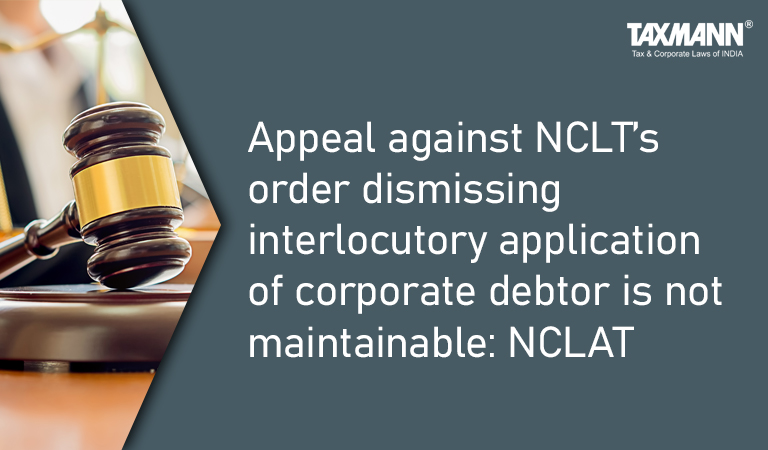Appeal against NCLT’s order dismissing interlocutory application of corporate debtor is not maintainable: NCLAT
- Blog|News|Insolvency and Bankruptcy Code|
- 2 Min Read
- By Taxmann
- |
- Last Updated on 27 August, 2021

Case details: Kerala Ayurveda Ltd. v. Tata Global Beverages Ltd. - [2021] 129 taxmann.com 212 (NCLAT - Chennai)
Judiciary and Counsel Details
-
- Venugopal M., Judicial Member and V.P. Singh, Technical Member
- T.K. Bhaskar and Sanjay Lodha, Advs. for the Appellant.
- Joseph Kodianthara and Mithun, Advs. for the Respondent.
Facts of the Case
The financial creditor filed Corporate Insolvency Resolution Process (CIRP) application on account of default on part of the corporate debtor. The NCLT, on basis of the extract of a statement of accounts maintained by the financial creditor, dismissed an interlocutory application filed by the corporate debtor raising plea of limitation.
In the appeal, the corporate debtor sought permission to raise pleas of limitation and also as regards aspect of true extract of the statement of accounts maintained by financial creditor.
Although the instant appeal was not maintainable in law, liberty was to be granted to a corporate debtor to raise the plea of limitation in the main CIRP application before NCLT being a ‘question of fact and law’.
Further, it was open to a corporate debtor to raise a plea of veracity/admissibility of true extract of the statement of accounts maintained by the financial creditor and both sides were to be at liberty to marshal on factual and legal pleas to raise same before NCLT while adverting to or countering same,
NCLT Held
Therefore, the NCLT was to provide an adequate opportunity of hearing to respective parties and pass a reasoned speaking order on merits, uninfluenced and untrammelled with any of observations made by instant Tribunal.
List of Cases Referred to
-
- Kerala Ayurveda Ltd. v. Tata Global Beverages Ltd. [2021] 129 taxmann.com 211 (NCLT – Kerala) (para 4).
Disclaimer: The content/information published on the website is only for general information of the user and shall not be construed as legal advice. While the Taxmann has exercised reasonable efforts to ensure the veracity of information/content published, Taxmann shall be under no liability in any manner whatsoever for incorrect information, if any.

Taxmann Publications has a dedicated in-house Research & Editorial Team. This team consists of a team of Chartered Accountants, Company Secretaries, and Lawyers. This team works under the guidance and supervision of editor-in-chief Mr Rakesh Bhargava.
The Research and Editorial Team is responsible for developing reliable and accurate content for the readers. The team follows the six-sigma approach to achieve the benchmark of zero error in its publications and research platforms. The team ensures that the following publication guidelines are thoroughly followed while developing the content:
- The statutory material is obtained only from the authorized and reliable sources
- All the latest developments in the judicial and legislative fields are covered
- Prepare the analytical write-ups on current, controversial, and important issues to help the readers to understand the concept and its implications
- Every content published by Taxmann is complete, accurate and lucid
- All evidence-based statements are supported with proper reference to Section, Circular No., Notification No. or citations
- The golden rules of grammar, style and consistency are thoroughly followed
- Font and size that’s easy to read and remain consistent across all imprint and digital publications are applied



 CA | CS | CMA
CA | CS | CMA
